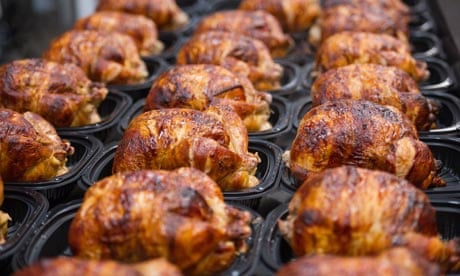Rotisserie chickens could become an endangered species, the British Poultry Council (BPC) has warned, following a trial to see how customers will respond to the addition of VAT to the cost of hot, cooked birds.
From 1 October VAT rules will see the cost of whole rotisserie chickens rise by 20% – about 88p a bird or totaling £34m a year, according to the council.
During a trial price rise at one Morrisons store, designed to emulate the addition of VAT, sales fell by 9%. The BPC said if this fall was replicated throughout the UK, consumers would buy 73,000 fewer birds from high street supermarkets every week.
The move to add VAT to the cost of hot cooked chickens is a leftover of the controversial pasty tax, which caused more outrage when it was announced in the 2012 budget than just about any other measure.
The ensuing uproar persuaded the government to cancel plans to class hot pasties and sausage rolls as takeaway food, which incurs VAT. But the new rules still apply to rotisserie chickens, even though research indicates they are generally eaten later than the point of purchase and as part of a main meal.
A poll by parenting website NetMums found that 86% of those who responded eat ready cooked supermarket chickens, with 99% saying they use the chickens to feed a minimum of two people and nearly half saying they use each chicken to make two or more meals.
Three in every four mums responding to the poll buy rotisserie chicken when they want a nutritious family meal but are short on time.
NetMums founder Siobhan Freegard said: "Family finances are in the worst state for over a generation, and struggling parents simply cannot afford to pay out anymore. This proposed tax on roast chickens isn't targeting junk food or unhealthy snacks, but will make it harder for families to put a wholesome hot meal on the table."
The tax will also hit poultry farmers who already face steep increases in feed costs this autumn following drought in the US.
Peter Bradnock of the BPC said: The value of lost sales could be as much as £17m, or around 4 million birds a year.
"This is a very high cost to consumers and chicken farmers alike for only a relatively tiny tax gain in the government coffers," he said. "It is disproportionate and the fact it singles out only rotisserie chicken in the supermarket makes it doubly unjust."
Morrisons and the BPC have joined forces to organise a nationwide petition telling the government "Don't Tax Our Roast". People can join the petition online or text CHICKEN FIRSTNAME SURNAME to 88802 (texts will be charged at standard network rates).

Comments (…)
Sign in or create your Guardian account to join the discussion